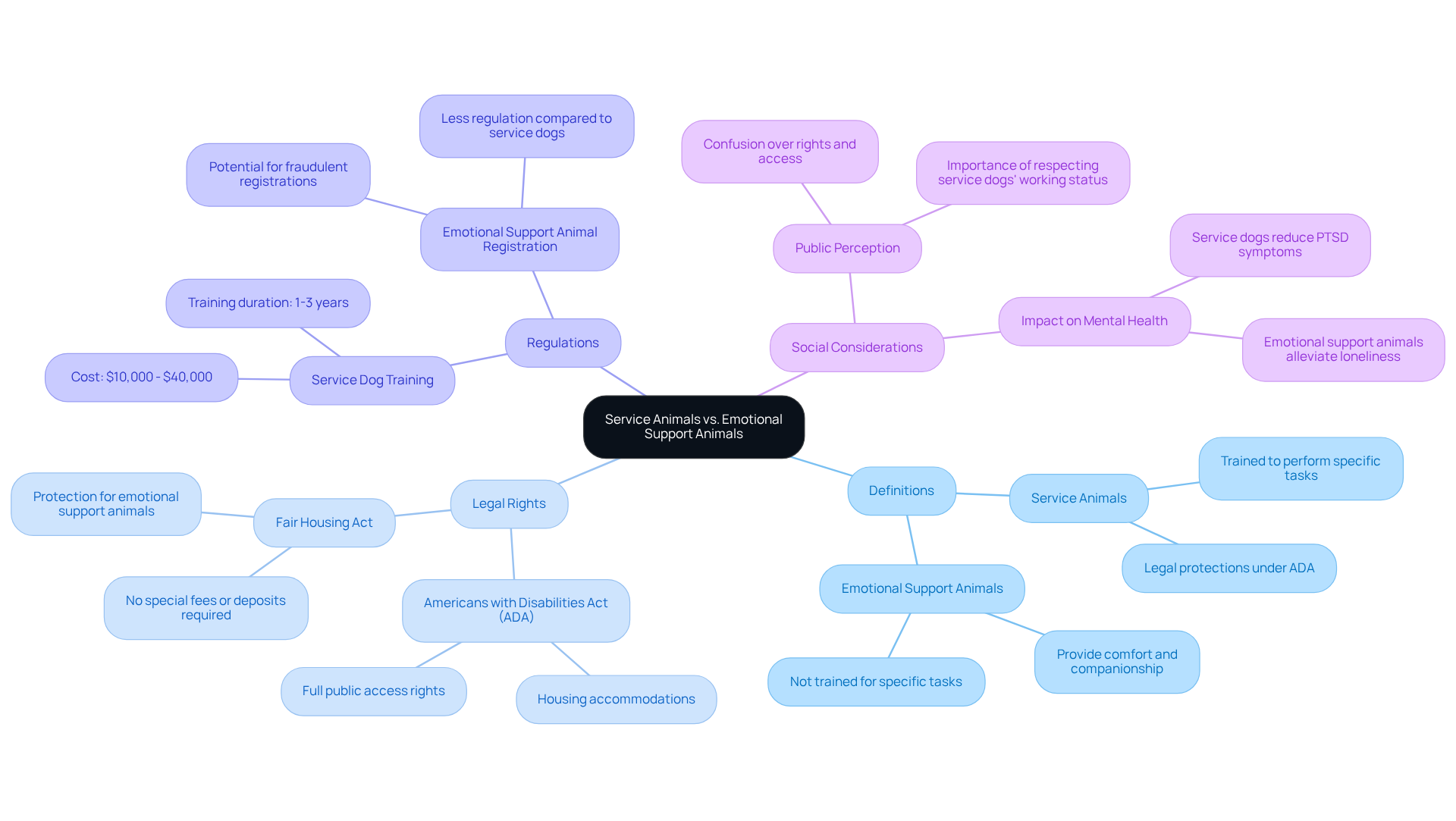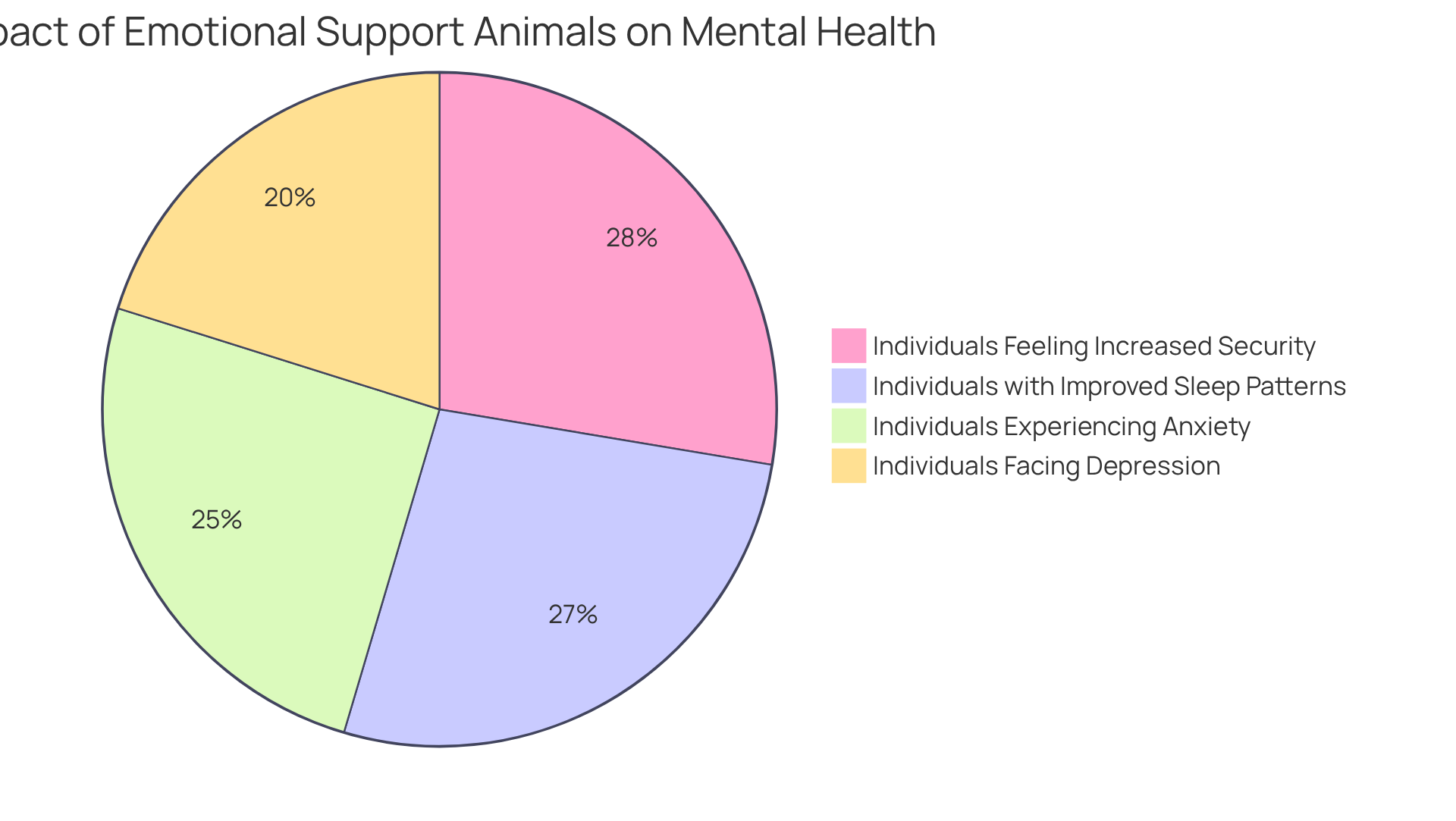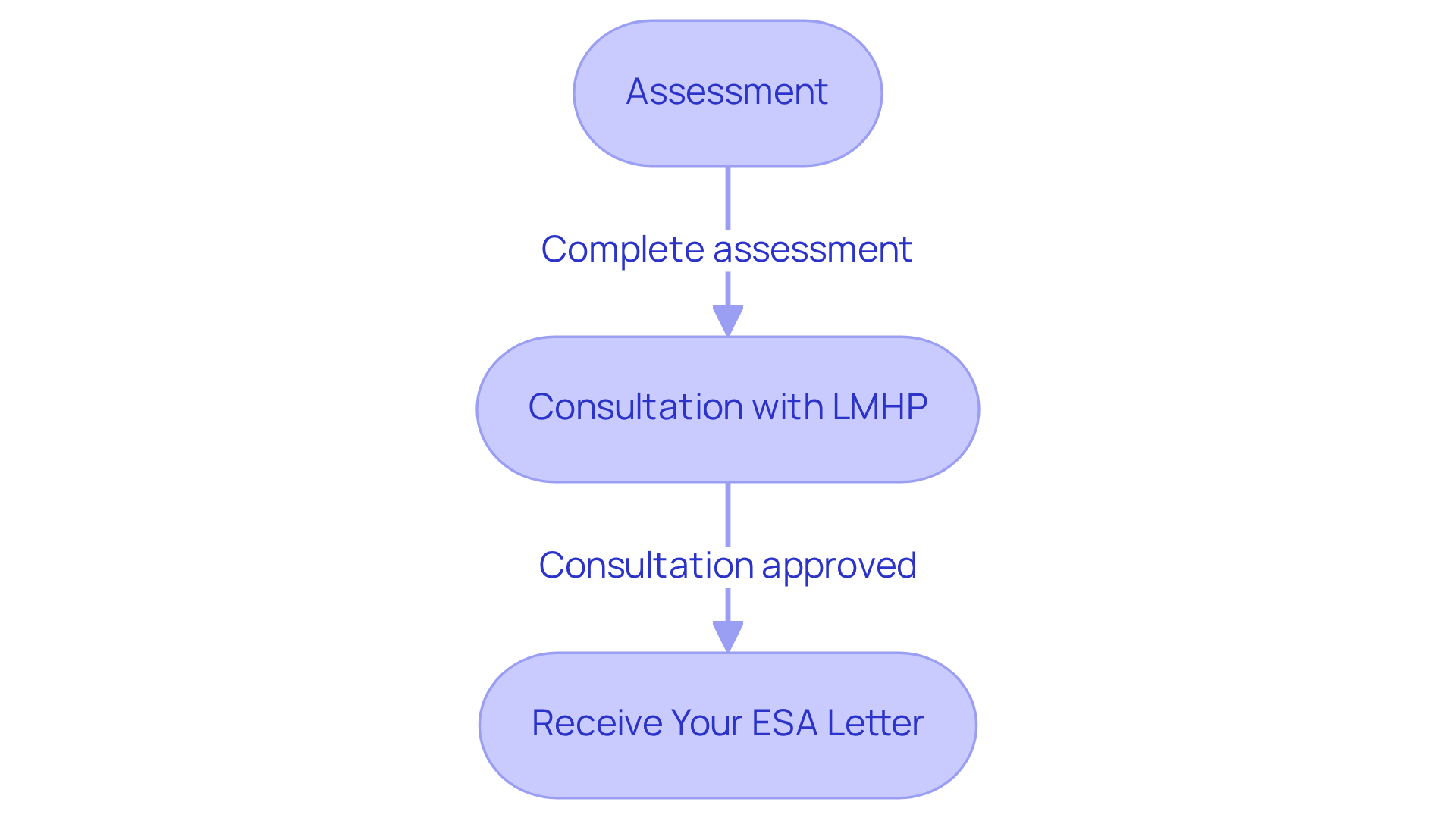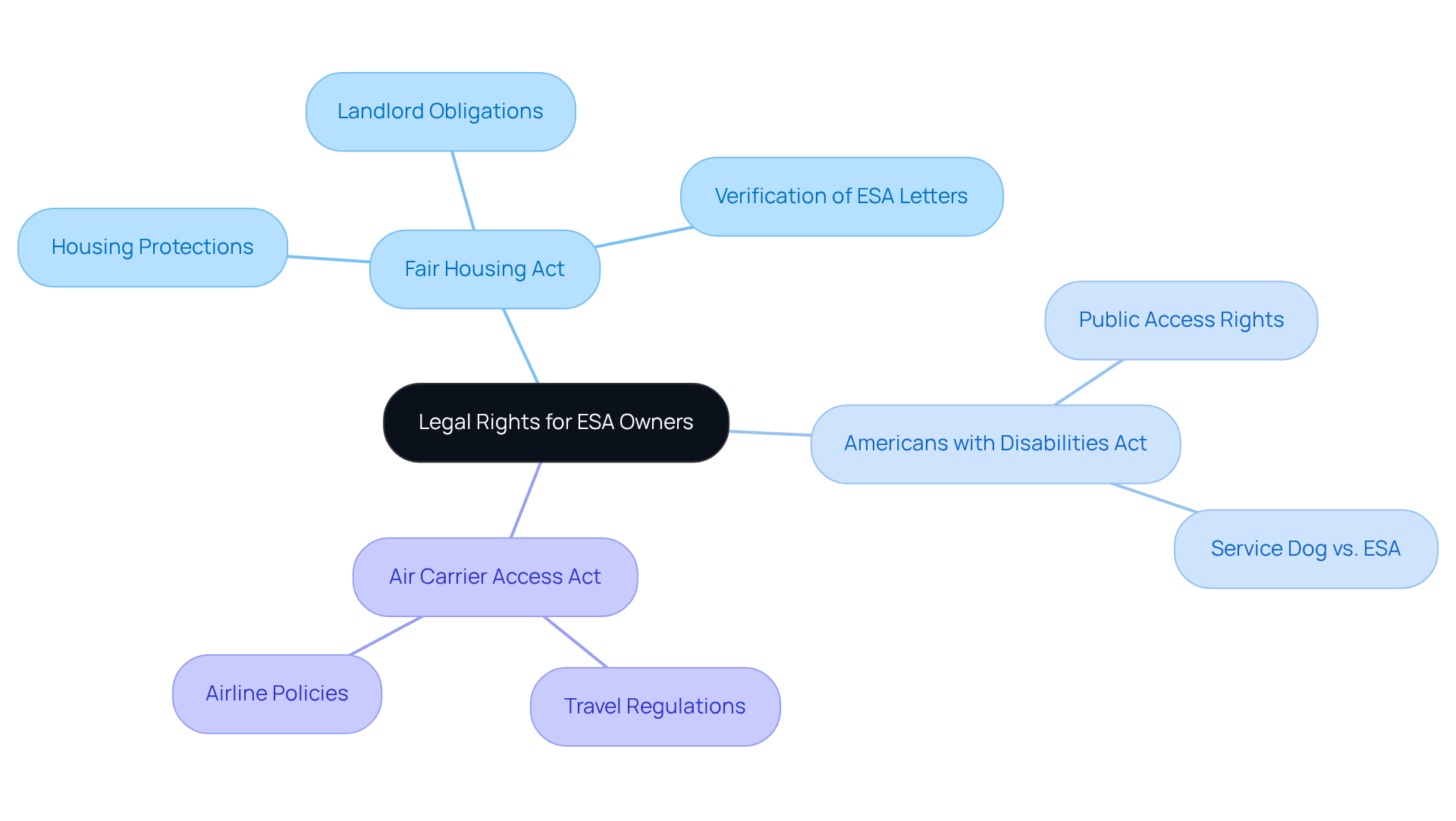

Mastering the Role of a Mental Health Animal for Support
by Lena Park
Last updated: July 10, 2025
Verified and Approved by:
Angela Morris,
MSW, LCSW
Fact Checked

Overview
This article explores the vital role of emotional support animals (ESAs) in providing much-needed mental health support. Many individuals face emotional challenges such as anxiety and depression, which can feel overwhelming at times. The presence of an ESA can bring comfort and alleviate these struggles, offering therapeutic benefits that make a significant difference in daily life.
It is also essential to understand the legal distinctions between ESAs and service animals. Knowledge of your rights under the Fair Housing Act and other regulations is crucial in ensuring that ESA owners receive the proper access and accommodations they deserve. By recognizing these rights, individuals can feel more secure and supported in their journey towards better mental health.
Ultimately, emotional support animals serve not just as companions, but as a source of solace and healing. If you or someone you know is navigating the complexities of mental health, consider the compassionate support that an ESA can provide. Remember, you are not alone in this journey, and there are resources available to help you find the support you need.
Introduction
In today’s world, where mental health challenges are increasingly acknowledged, understanding the distinction between service animals and emotional support animals is vital. Many individuals find emotional support animals to be integral to their well-being. This article explores:
- The therapeutic benefits of these companions
- The process of obtaining the necessary documentation
- The legal rights that safeguard their owners
Yet, with varying regulations and societal perceptions, how can individuals effectively advocate for their emotional support companions while navigating potential obstacles? By recognizing the struggles faced by those with mental health issues, we can appreciate the profound impact that emotional support animals can have on their lives. The ESA letter serves as a supportive solution, providing the necessary validation for these cherished companions. Together, we can navigate this journey, ensuring that every individual feels understood and supported in their quest for emotional well-being.
Differentiate Between Service Animals and Emotional Support Animals
Assistance creatures are specifically trained to carry out tasks that aid individuals with disabilities, such as guiding the visually impaired or alerting those with hearing impairments. This crucial distinction sets them apart from emotional support animals, which primarily offer comfort and companionship without performing specific tasks.
For those seeking to utilize their pets for emotional support, understanding this difference is essential, as it directly impacts their legal rights under the Americans with Disabilities Act (ADA) and other regulations. Under the ADA, service dog owners enjoy full public access rights, allowing them to accompany their handlers in various public spaces, including restaurants, stores, libraries, and public transportation. They are also entitled to housing accommodations, even in areas where pets are typically restricted.
Emotional support animals mainly assist in housing and travel situations, protected under the Fair Housing Act and the Air Carrier Access Act. Current statistics suggest that there are roughly 500,000 service dogs in the U.S., while emotional support creatures face less regulation, leading to potential confusion regarding their rights and access.
Legal cases involving emotional support creatures and service companions highlight the importance of recognizing these distinctions, as they can significantly influence individuals’ ability to advocate for their needs in different environments. It is vital to respect the working status of service dogs and avoid distracting or petting them without permission from their handlers, as this can interfere with their tasks and compromise the safety and well-being of the handler.
By understanding these nuances, we can foster a more supportive environment for all individuals relying on these invaluable companions.

Explore the Therapeutic Benefits of Emotional Support Animals
Emotional support creatures play a vital role in enhancing the emotional well-being of their owners. They provide companionship that alleviates feelings of loneliness and significantly assist in managing symptoms of anxiety and depression. Research shows that interacting with animals can lower cortisol levels—often referred to as the stress hormone—while simultaneously increasing oxytocin, a hormone linked to bonding and happiness. This biochemical response fosters feelings of relaxation and contentment.
For individuals grappling with PTSD, emotional support animals offer a sense of safety and stability, which can be transformative in navigating daily challenges. Research indicates that:
- 90.8% of individuals requesting an ESA letter reported experiencing anxiety
- 72.4% faced depression
The companionship of an ESA can lead to an impressive:
- 99.29% of participants feeling increased security
- 96.80% experiencing improved sleep patterns
This is highlighted in a survey conducted by The Zebra.
Understanding these benefits allows individuals to recognize emotional support animals as a legitimate source of emotional assistance. The growing reliance on these creatures underscores their importance as a mental health animal in mental health care, especially in light of the increased mental health challenges reported during the COVID-19 pandemic. Additionally, it is essential to acknowledge the legal rights of emotional support animal owners under the Fair Housing Act and the Air Carrier Access Act, which enable those with mental health conditions to request reasonable accommodations for their mental health animals, ensuring they can live and travel alongside their companions.
As more individuals recognize the profound impact of mental health animals on mental health, the dialogue surrounding their role in therapeutic settings continues to evolve. Wellness Wag, with its swift turnaround for ESA letters and commitment to customer satisfaction, plays a crucial role in facilitating access to these essential emotional support resources. Clients like James B. and Linda S. have shared their positive experiences with Wellness Wag, praising the ease and efficiency of the ESA approval process, and highlighting the supportive and friendly staff. These testimonials reflect a consistent theme of satisfaction, reinforcing Wellness Wag’s dedication to ensuring that individuals seeking emotional support can navigate the process with confidence and ease.

Navigate the Process of Obtaining an ESA Letter
Navigating the journey of mental health can be incredibly challenging, and for many, the support of a mental health animal can make a world of difference. To obtain a legitimate ESA letter, follow these essential steps with care and understanding:
-
Assessment: Start with a brief assessment to determine your eligibility for an ESA. This process typically involves answering questions about your mental well-being and how a pet can aid you in managing your symptoms. It’s a moment to reflect on your needs and the comfort an animal can provide.
-
Consultation: Next, schedule a consultation with a licensed mental health professional (LMHP) who can thoughtfully evaluate your situation. Many providers offer online consultations, making it easier than ever to access the support you deserve.
-
Receive Your Letter: If approved, you will receive your ESA letter, often within 24 hours. It’s important that this letter is on official letterhead, includes the LMHP’s license number, and clearly articulates your need for an ESA. This documentation is vital for securing housing and travel accommodations, ensuring that your emotional well-being is prioritized.
The average time to receive an ESA letter may vary, but with experienced providers, it can be as swift as one day. Successful applications typically arise from open communication about how the mental health animal alleviates mental health challenges, allowing providers to truly understand the necessity of the letter. By following these steps, you can navigate the process with confidence and ensure that you have the proper documentation to support your emotional journey. Remember, you are not alone in this; there is compassionate support available to help you every step of the way.

Understand Legal Rights and Protections for ESA Owners
Emotional Support Animal (ESA) owners often face significant challenges, particularly when it comes to housing. The Fair Housing Act (FHA) offers essential protections, allowing these individuals to live with their animals in places that typically prohibit pets. This legislation is especially important for those navigating mental health difficulties, as it helps maintain the vital therapeutic bond with their mental health animals. Did you know that around 18% of pet owners in the U.S. have emotional support animals? This statistic reflects a growing recognition of the profound benefits these mental health animals provide.
Despite these protections, many ESA owners still encounter housing discrimination. Studies reveal that a considerable number of individuals face obstacles when seeking accommodations. Advocacy groups emphasize the importance of understanding these rights, as many landlords may not be aware of their legal obligations to accept emotional support animals. It’s crucial for ESA owners to be informed and empowered in these situations.
While there is no legal requirement for service dogs to be certified or registered, obtaining certification can strengthen credibility and showcase that the service dog has received proper training. Service dogs enjoy broader public access rights under the Americans with Disabilities Act (ADA), allowing their owners to bring them into various public spaces, such as restaurants, stores, libraries, and on public transportation. However, it’s important for emotional support animal owners to recognize that, unlike service dogs, ESAs do not share the same access rights in public environments.
Moreover, the Air Carrier Access Act (ACAA) offers specific rights for traveling with ESAs on airlines. Yet, recent amendments have changed the travel landscape for ESAs, necessitating that owners navigate the policies of individual airlines. Therefore, it is vital for ESA owners to stay well-informed about their legal rights. This knowledge empowers them to advocate effectively for their needs, ensuring they can enjoy the companionship of their animals without unnecessary obstacles.

Conclusion
Understanding the role of emotional support animals (ESAs) is essential for recognizing their profound impact on emotional well-being. Many individuals face emotional challenges that can feel overwhelming. By differentiating between service animals and ESAs, you can navigate your rights and appreciate the benefits these animals provide. This knowledge empowers you to advocate for your needs, ensuring access to the companionship and comfort that these animals offer.
The therapeutic benefits of ESAs are significant; they can alleviate symptoms of anxiety and depression while fostering a sense of safety for individuals coping with PTSD. Legal protections for ESA owners under the Fair Housing Act and the Air Carrier Access Act are crucial, allowing you to live and travel with your companions without unnecessary obstacles. Moreover, the step-by-step process for obtaining an ESA letter is designed to guide you through what can often be a daunting journey, reinforcing the importance of proper documentation and support.
As we increasingly recognize the importance of mental health animals, it is vital to raise awareness and understanding of their roles in therapeutic settings. Advocating for the rights of ESA owners not only enhances individual well-being but also promotes a more inclusive society that values the profound bond between humans and their emotional support animals. Embracing this knowledge can lead to a more compassionate approach to mental health, ensuring that those in need have the resources and support to thrive alongside their beloved companions.
Frequently Asked Questions
What is the main difference between service animals and emotional support animals?
Service animals are specifically trained to perform tasks that assist individuals with disabilities, while emotional support animals provide comfort and companionship without performing specific tasks.
What legal rights do service dog owners have under the Americans with Disabilities Act (ADA)?
Service dog owners have full public access rights, allowing their dogs to accompany them in various public spaces such as restaurants, stores, libraries, and on public transportation. They also have housing accommodations even in areas where pets are typically restricted.
How are emotional support animals protected under the law?
Emotional support animals are primarily protected under the Fair Housing Act and the Air Carrier Access Act, which assist them in housing and travel situations.
How many service dogs are estimated to be in the U.S.?
Current statistics suggest that there are roughly 500,000 service dogs in the U.S.
Why is it important to recognize the distinctions between service animals and emotional support animals?
Recognizing these distinctions is crucial as it influences individuals’ ability to advocate for their needs in different environments and impacts their legal rights regarding access and accommodations.
What should people keep in mind when interacting with service dogs?
It is vital to respect the working status of service dogs and avoid distracting or petting them without permission from their handlers, as this can interfere with their tasks and compromise the safety and well-being of the handler.
Certify Your Emotional Support Animal Today

Why You Can Rely on Us?
At Wellness Wag, we believe your pet deserves care rooted in both science and compassion. Each article is carefully researched, written in clear language for pet owners, and then reviewed by qualified professionals to ensure the information is evidence-based, current, and practical for real-life care. Our goal is to help you feel confident in making informed decisions about your pet’s health and well-being.
Reviewed by
Angela Morris, MSW, LCSW
Angela is a licensed clinical social worker with 20 years of experience in patient advocacy and community mental health. She has assisted numerous clients with ESA evaluations and brings a deep understanding of disability accommodations, ensuring that all information is accurate, supportive, and practical.

Written by :
Lena Park
Last Updated :
July 10, 2025












